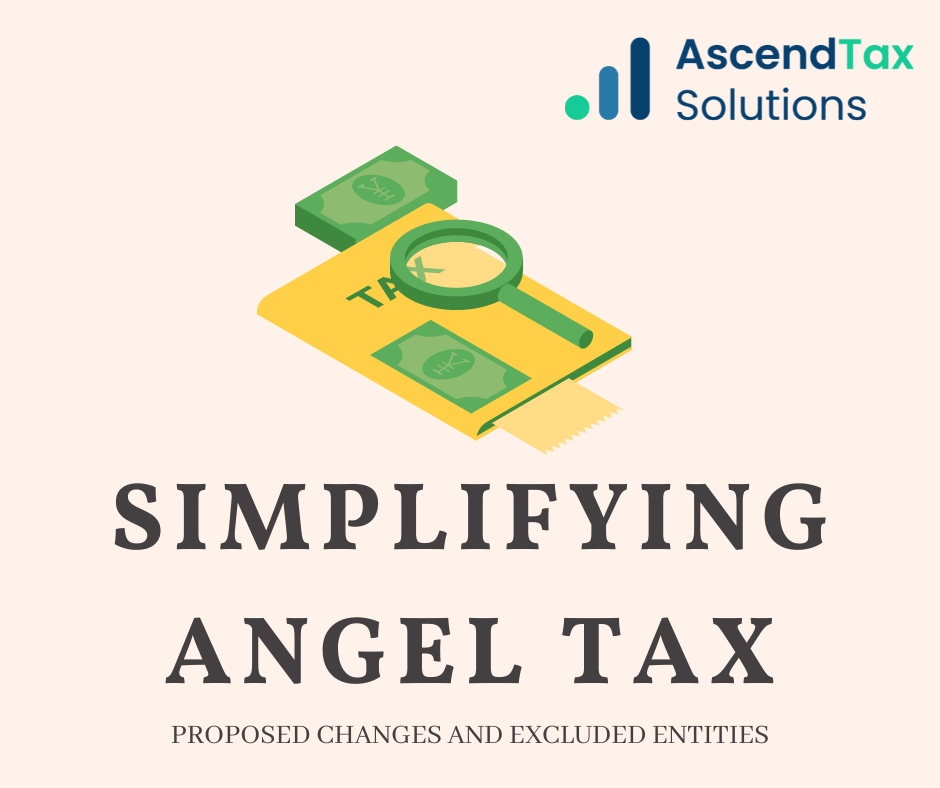Simplifying Angel Tax: Proposed Changes and Excluded Entities

Angel Tax has been a subject of concern for startups and investors in India. To address these concerns and promote ease of doing business, the Central Board of Direct Taxes (CBDT) has proposed changes to Rule 11UA and announced the notification of excluded entities. This blog aims to provide a user-friendly explanation of these proposed changes and their potential impact on startups and investors.
Angel Tax refers to the income tax levied on the consideration received by a company for issuing shares if the consideration exceeds the Fair Market Value (FMV) of the shares. It was introduced to curb money laundering and prevent the inflow of black money into startups. However, its implementation has raised concerns due to its impact on genuine startups and investors.
Proposed Changes to Rule 11UA:
- Additional Valuation Methods: Currently, Rule 11UA prescribes the Discounted Cash Flow (DCF) and Net Asset Value (NAV) methods for valuing shares for resident investors. The proposed changes seek to expand the valuation methods to include five additional methods specifically for non-resident investors. This expansion aims to provide more flexibility and options for determining the FMV of shares during investments.
- Price Matching for Resident and Non-Resident Investors: Under the proposed changes, if a company receives consideration from a non-resident entity specified by the Central Government, the FMV of the equity shares for both resident and non-resident investors can be determined based on the price of the equity shares corresponding to such consideration. This provision is subject to two conditions: the consideration should not exceed the aggregate consideration received from the specified entity, and the consideration should be received within 90 days of the share issuance.
- Acceptable Valuation Report: To streamline the valuation process, the proposed changes suggest that the valuation report by a Merchant Banker will be acceptable if it is not more than ninety days old from the date of share issuance. This provision aims to ensure the accuracy and relevance of valuation reports, considering the dynamic nature of the market.
- Safe Harbor Provision: Recognizing the impact of forex fluctuations and other economic indicators on the valuation of unquoted equity shares during multiple rounds of investment, the proposed changes provide a safe harbor of a 10% variation in value. This provision aims to accommodate reasonable variations in valuation, thereby reducing unnecessary tax burdens on startups and investors.
Notification of Excluded Entities: The CBDT has also proposed to notify certain classes of non-resident investors to whom section 56(2)(viib) of the Income-tax Act shall not be applicable. These include:
- Government and government-related investors such as central banks, sovereign wealth funds, and international organizations controlled by the government.
- Banks or entities involved in the insurance business subject to applicable regulations in their respective countries.
- Entities registered as Category-I Foreign Portfolio Investors with the Securities and Exchange Board of India.
- Endowment funds associated with universities, hospitals, or charities.
- Pension funds established under the law of foreign countries.
- Broad-based pooled investment vehicles or funds with more than 50 investors, excluding hedge funds or funds employing complex trading strategies.
The proposed changes to Rule 11UA and the notification of excluded entities represent a significant step towards simplifying Angel Tax and supporting the growth of startups in India. These changes aim to provide more valuation options, align the treatment of resident and non-resident investors, and exempt certain entities from the purview of Angel Tax. If implemented, these changes will likely boost investor confidence and encourage investments in the Indian startup ecosystem, contributing to the country’s economic growth and innovation.
Disclaimer: This blog post has been written based on the information provided by the Ministry of Finance through the Press Information Bureau (PIB). The content of this blog is intended for informational purposes only and should not be considered as professional or legal advice. Readers are encouraged to refer to the official sources and consult with relevant authorities or professionals for accurate and up-to-date information regarding Angel Tax and related regulations. The author and the platform do not assume any responsibility or liability for any actions taken based on the information provided in this blog.
Simplifying Angel Tax: Proposed Changes and Excluded Entities Read More »

